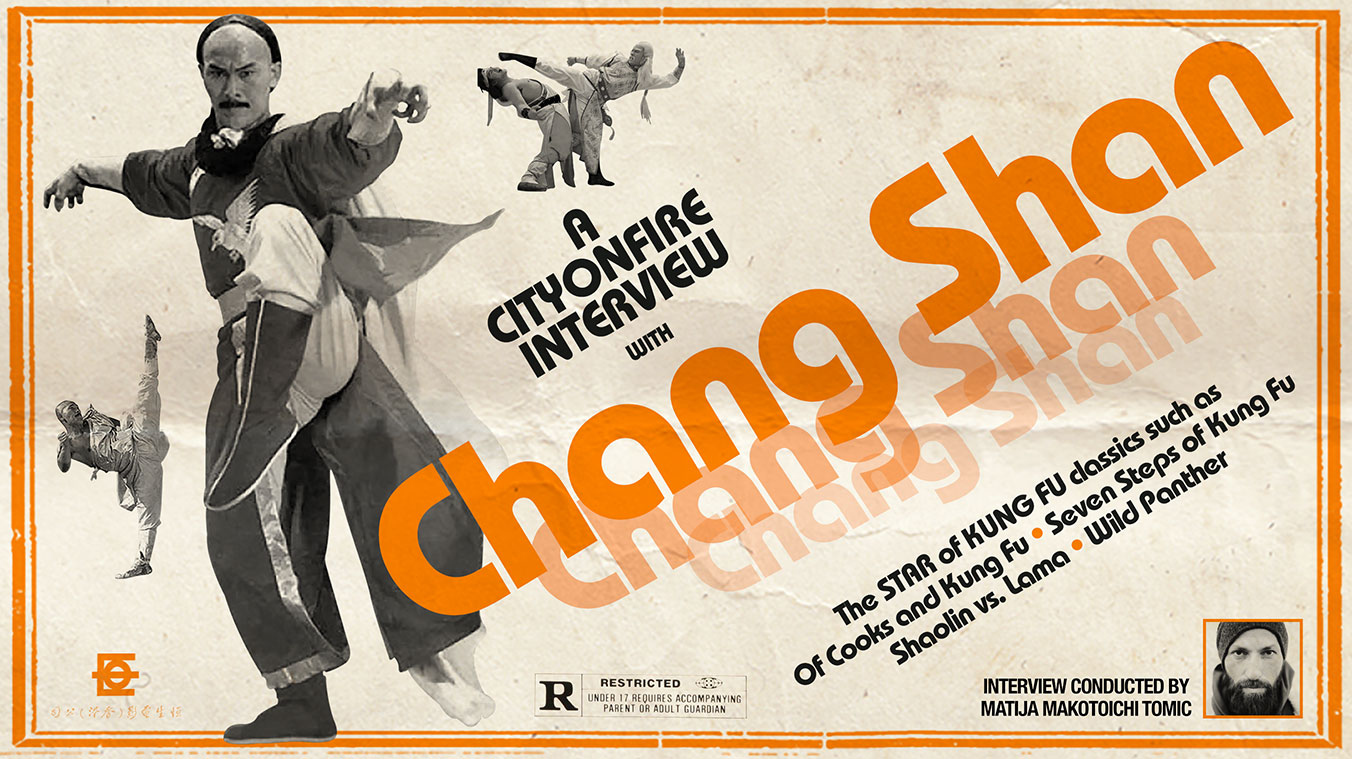
Meet one of kung fu cinema’s best loved stars, Mr. Chang Shan. Whether you know him as the white-haired villain from Ting Chung’s classics Of Cooks and Kung Fu (1979) and Seven Steps of Kung Fu (1979), or as the ferocious Golden Wheel Lama from Lee Tso-nam’s fan favorite Shaolin vs. Lama (1983), you know Chang Shan can play a menacing villain as well as throw some mean kicks around, all while remaining one of the nicest people you’ll ever get to talk to.
Born in Incheon, South Korea, on May 23. 1956, Chang Shan got his break in the industry following his win at the second World Cup Sanda championship held in Taiwan in 1978. Starring in the two afore-mentioned classics directed by his mentor Ting Chung, Chang Shan already proved to be a force to be reckoned with, an actor whose skill matches his dominating presence on screen.
Through the years he worked with some of Taiwan’s greatest independent directors, such as Joseph Kuo and Lee Tso-nam, next to roles in movies directed by Wu Kuo-ren, Sun Chung and Wu Ma, and starring alongside top-tier talents from in front and behind the camera, such as Alexander Lo Rei, Robert Tai, Jack Long, Tommy Lee, Peng Kang and Yuen Biao, just to name a few, adding memorable roles to his rich career that is far from over even today when he is at his late 60’s. Loved by the fans for his striking performances, outstanding martial arts abilities and unforgettable villain portrayals, Chang Shan remains one of kung fu cinema’s favorite stars that fans only ever spoke of in praise. Meet the man behind the legend.
I visited Taiwan in November 2018, as part of the crew accompanying my friends’ band on their first Asian tour. As the date of our trip approached, a thought occurred to me. Why not do an interview with Chang Shan while I’m there?
I’ll admit it was a rushed one. I wrote the majority of the questions on the plane for Kuala Lumpur, our first stop of the tour, while the rest was improvised on the spot. Our tour manager’s girlfriend served as an interpreter as there was no time to search for a professional. This lack of a better translation is actually the reason why this interview took years to see the light of day. The material seemed promising and a word for word translation was called for, even if that meant additional, unplanned expenses that were not small.
Was the effort put into realizing this interview worth it? Absolutely.
Meeting Chang Shan was an overwhelming experience. I’ll admit I was late for the interview and was pretty nervous arriving at our rendez-vous place. Brother Shan wasn’t there. I started panicking, thinking I blew it and felt guilty for leaving the legend waiting. So unprofessional. All of a sudden, this youngish looking, elderly gentleman appeared from behind the corner, accompanied by his better half hand in hand, walking slowly towards me. Everything else faded. As we greeted, I started apologizing for being late, but brother Shan kept calming me down saying there’s no reason to worry. His calmness and enjoyable presence were captivating. Who would have thought he’d turn out to be such a joker?
This interview took place at my hostel in Taipei and it was in front of that hostel where I first met brother Shan. I’ll never forget this. Upon explaining to him I arrived all the way from Europe, he said if I traveled this far to be here now, the least he could do is to come to my place for the interview. Only a few times in my life have I encountered such out-of-this-world thoughtfulness. I was amazed.

Author Matija Tomić and Chang Shan.
Speaking of amazing, I owe to give credit to all the wonderful people without whom this interview would never have happened. A big thank you to Renee S. Taylor of Charng Shan Cinema, without this facebook group this interview would never even be possible. Thanks to Dan, Kiki, my forever trusted friend Goran Nježić and finally, to my kung fu brother Martin Sandison, who ended my long search for a translator by introducing me to Xiaodong (Donald) Song, who the two of us called Donnie on account of you know who.
More than four years after being conducted, this interview is finally ready to be shared with the fans. Brother Shan was satisfied with the questions, I can only hope you’ll be satisfied with the answers. Please enjoy.
*Note: This interview was conducted with myself speaking English and brother Shan speaking Chinese. I’ve indicated when, on occasion, Chang Shan replied in English. I’ve tried my best to identify all the names and the titles he mentioned in this interview, but a few still remain unidentified.
Chang Shan: (Speaking in English) Welcome to Taiwan.
Matija Tomić: Thank you very much.
MT: So, first of all, I want to thank you for coming and agreeing to meet me on such a short notice. So, big thank you first of all.
CS: Even though it was on such short notice, because you are a member of Chang Shan fan club, I wanted to meet you. (Speaking in English) Thank you (smiling).
MT: So, you are living in Taiwan now, but you were born in South Korea. Was there never a need to return to your homeland?
CS: I am Chinese, my brother is still living in Korea. I go to Korea one or two times each year to see him.
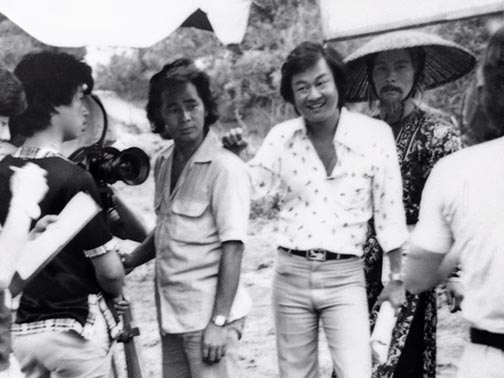
Chang Shan with director Ting Chung during the filming of Of Cooks and Kung Fu.
MT: You live here because you like Taipei?
CS: I have lived in Taiwan for over 40 years now, my wife and my parents are all in Taiwan, it is not about whether I like it or not. Also because of my job.
MT: Was it your career in the movie industry that made you come to Taiwan in the first place, to change your place of living?
CS: Why did I come to Taiwan? To shoot movies. They invited me for the movies, and I decided to stay. (Speaking in English) From 1979.
MT: Can you remember what was the first movie you made?
CS: (Speaking in English) Director Ding Zhong [Ting Chung].
MT: Was it Seven Steps of Kung Fu?
CS: (Speaking in English) Seven Steps, second movie.
MT: The first was Of Cooks and Kung Fu?
CS: (Speaking in English) Yes, Of Cooks and Kung Fu, yes. Same director, Ding Zhong.
MT: So, in the ‘70s and the ‘80s, South Korea was also making kung fu movies. You won the kung fu tournament in 1978 and was invited to make kung fu movies in Taiwan. Why not in South Korea? Were you never approached by Korean filmmakers to star in a Korean kung fu movie?
“At that time, film production companies used film negatives, which had to be imported when filming. Taiwan did not produce negatives, so they had to be purchased in Hong Kong”
CS: This was not by choice. Kung fu movies from Hong Kong and Taiwan were the most popular at the time, even Korean action actors came to Taiwan to film. At that time, Chinese movies were sold all over the world. For example, if you were filming in Korea and I was filming in Taiwan, our status would be different. It’s like Taiwanese actors standing next to Hollywood actors, the difference was that big. The movies filmed in Korea were not wanted overseas and couldn’t be sold to be honest. It wasn’t me who chose at the time.
I participated in the 1978 World Cup Sanda competitions, what do you call it now? Combat sports? It’s called combat sports. I won the championship in the second World Cup, and they asked me to do a movie. That’s the story, let’s not talk about it anymore. There’s nothing worth mentioning.
MT: (laughs) Okay, I understand. You know, the best kickers, best leg fighters in kung fu movies were Koreans, and studied Taekwondo. Hwang Jang-lee (-)
CS: Hwang Jang-lee, Whang In-shik [Hapkido in this case], Ca Sa Fa (-)
MT: Casanova Wong.
CS: Casanova Wong, Eagle Han.
MT: Eagle Han, yes (laughs). What I’d like to know, being that you worked in both Hong Kong and Taiwan, is how would you describe the difference between kung fu movies made in the Hong Kong studio system and the ones made independently in Taiwan?
“When you go to Hong Kong, which was a British colony, to work, you must have a work permit, and you need to pay a high tax rate of 25% to 35%. In contrast, when we shoot films in Taiwan, we only needed to pay a tax rate of 10%”
CS: Actually, I have never filmed in Hong Kong. I have only filmed in Taiwan. At that time, film production companies used film negatives, which had to be imported when filming. Taiwan did not produce negatives, so they had to be purchased in Hong Kong. If your film company was affiliated with a company in Hong Kong, for example, if you were Da Hua Film Company and affiliated with a Hong Kong company, you could import negatives and then export them without paying taxes. Therefore, many film companies in Taiwan added a Hong Kong film company to their affiliation. So, when I filmed those movies, they thought I was filming in Hong Kong because Hong Kong is a tax-free zone.
At that time, a foot of film negative cost around 10 US dollars, and we needed around 45,000 feet of film negative to film a movie. Import taxes were heavy, especially entertainment taxes and export taxes. So, they would purchase negatives, film the movie, export the negatives, and then export them through the East Asia Shipping Company in Hong Kong. They would then sell the film overseas through the Hong Kong company without paying taxes. That’s why many film companies in Taiwan were affiliated with Hong Kong companies.
MT: So, you never made a movie in Hong Kong?
CS: (Speaking in English) Yes, never.
MT: So, the movie was shot in Taiwan and the footage was sent to Hong Kong to save money?
CS: (Speaking in English) Yes.
MT: Very precious information.
(laughter)
CS: This is the boss’s business. Nobody has ever asked me this question before. They used to ask me when I would start shooting a new movie and what I thought of certain directors. So, this is exclusive. Regarding this question, I am very willing to tell you who I worked with for my first film and which director I liked the most.
When you asked me about the business aspect, were you referring to the question of why I didn’t go to Hong Kong to make movies? At that time, it was not easy for us to go to Hong Kong to shoot films because we held Republic of China passports. When you go to Hong Kong, which was a British colony, to work, you must have a work permit, and you need to pay a high tax rate of 25% to 35%. In contrast, when we shoot films in Taiwan, we only needed to pay a tax rate of 10%. There is a big difference. If I make 500,000 yuan for a film, and I pay 35%, I would only get 150,000 yuan. If the tax rate is 10%, then it would only cost 10,000 yuan. Yes, there is a big difference.
During that era, when we were shooting films, many actors from Hong Kong came to Taiwan to shoot films, such as [Stephen] Tung Wei, Sammo Hung, Jackie Chan and Yuen Biao. At that time, the film companies in Taiwan were relatively developed. And Hong Kong only had one major film company, Shaw Brothers, which signed actors to exclusive contracts. Unlike Taiwan, where there were many independent film companies. Therefore, many actors came to Taiwan to make money by acting in films. In the past, if you worked for Shaw Brothers, they would pay you 700 HK dollars per month for a ten-year contract, and that was it – you had no say in the matter.
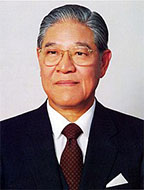
Lee Teng-hui
That’s why Jackie Chan stopped making films for a while and went to the United States. Later, he was brought back to Hong Kong by Golden Harvest and became successful. During that time, Hong Kong films were not as good as those made in Taiwan. Later on, Taiwan’s film industry declined due to political factors. It was good until before Lee Teng-hui’s presidency [1988-2000]. After Lee Teng-hui’s presidency, the entire film industry died out because of local productions pursuing ideology, like those by Hsiao Yeh and Wu Nien-jen, and those films could not sell overseas. [Hsiao Yeh is the pen name of Lee Yuan, novelist, awarded screenwriter and one of the people responsible for the launching of the Taiwanese New Wave movement in the early ‘80s. Wu Nien-jen is a novelist, actor, director and award-winning screenwriter, who was, much like Hsiao Yeh, hired by the CMPC to help stop its decline].
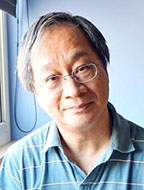
Hsiao Yeh
In the past, they didn’t allow the filming of Judge Bao or Liu Botong in Mandarin movies, so they filmed stories like Advising the Wife and Thunderbolt, and many of the stories in Advising the Wife were popular among overseas Chinese in Southeast Asia. Most of these overseas Chinese came from Fujian, Zhangzhou and even Guangzhou, right? The problem was that they looked at the clothes, especially in Southeast Asia where many Chinese had suffered from Japanese invasion. When they saw the clothes, such as the small floral dresses and wooden clogs worn in the movie, they asked, “Is this our Chinese drama?” and stopped watching it. The entire movie market was declining year by year, not to mention over ten years.
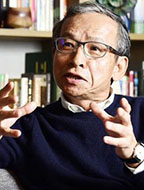
Wu Nien-jen
For example, if you wanted to shoot a Mandarin film, you had to apply for and have your script approved before shooting. The approval process took one or two years. Wow, it was deliberate, they wanted to stop you from filming. It was an ideological issue. After that, all of our TV and movie production couldn’t be sold overseas. Then they began buying Korean dramas, Japanese dramas, and now mainland Chinese dramas. Does Taiwan still have its own television industries? No. Nowadays, the staff works for over 20 hours a day. They shoot for more than ten days, making about ten episodes of TV series or about 200 episodes without changing the background or any camera angles.
(Speaking in English) Sorry, talk too much Chinese. Because you can’t speak Chinese, so I talk too much (laughs).
MT: (laughs) No, no, no, I have to learn.
CS: (Speaking in English) Sorry (laughs).
MT: You mentioned Shaw Brothers studio?
CS: There were many actors in the Shaw Brothers’ films, but that’s not a mistake. Why? The Shaw Brothers were very strict. For example, during that time, when you signed a contract with Shaw Brothers, I remember that one of their basic actors signed a contract for about ten years, which could be extended to twelve years. At that time, your salary was around 700 to 800 HK dollars per month, and 100 HK dollars was equivalent to 700 to 800 Taiwan dollars (a ratio of 1:7-8). Although the salary was high, when you worked on an independent film, everyone had different rates, and no one wanted to be tied down by Shaw Brothers. Similarly, Shaw Brothers didn’t want to be tied down either. Why? For example, many actors from Taiwan went to Hong Kong, such as Lu Feng and Gang Sheng [Chiang Sheng]. After signing the contract, they couldn’t stand it and came back to Taiwan. Then, once you signed a contract, they [SB] would bind you and you might not have any work for one or two years. That’s how it was.
MT: They had the freedom to work with whom they wanted in Taiwan? There was no contract in Taiwan?
“Shaw Brothers was a big company that everyone wanted to work for, but sometimes they would put you on hold for several years without any acting opportunities. Many people would return home without any work after going there”
CS: At that time in Taiwan, the maximum contract they would offer was three years. When I signed, it was the same. When I was competing in combat sports, I had to sign a contract for three years. They would definitely check, for example, how much money I would receive in the first year and how much my salary would be. They would also mention how many movies I would act in within a year, and how much I would earn for each movie. In the second year, they would offer a monthly salary. In the third year, it would be the same as the first year. If you did not act in nine movies in three years, the producer would still have to pay the agreed amount. After signing the contract, we would go to the court for notarization, and the contract was legally protected at that time.’
Shaw Brothers was a big company that everyone wanted to work for, but sometimes they would put you on hold for several years without any acting opportunities. Many people would return home without any work after going there. During that time, Shaw Brothers used Taiwanese actors, such as during the era of Cheh Chang. There were also actors such as Chiang Sheng and Lu Feng who went there during that time. After Cheh Chang had a disagreement with Shaw Brothers, there were no more movies for those actors, so they had no work and returned home.
During that time, Liu Chia-liang emerged and had his own actors, so he did not use Taiwanese actors. Liu Chia-liang was known for martial arts, while most actors who went to Taiwan during that time came from drama schools such as the Fu-hsing Drama School, where Hai Guang, Lu Guang, and Da Peng learned to do acrobatics [Hai Guang, Lu Guang and Da Peng were three military theater groups that merged in 1955 to form the Guoguang Opera Company]. There were many acrobatics in the movies during that time. He loved this, so during that era, there was this kind of distinction.
When we signed contracts in Taiwan, it was only for lead roles, so they would not sign with you if you were not the lead. When we signed, we agreed to act in three movies per year for three years, a total of nine movies. We would be paid according to our role as the lead actor, and our monthly salary would be higher than what others would earn for a single movie. At that time, when I won the World Cup championship, many people approached me to sign contracts. However, I did not expect to enter the movie industry. I was only there to represent South Korea in the World Cup. I did not think about these things. If you’ve seen this movie, you are my fan and good friend.
MT: What was the company that you signed the contract with?
CS: The first company that signed a contract with me was Eternal Film. Eternal included Ming Bao. Ming Bao is probably in his 90s now. At that time, I signed with him when he was already in his 60s or 70s.
After I signed the contract at that time, my passport didn’t allow me to go to Hong Kong. I don’t know if you know this, but many overseas Chinese now hold Republic of China passports, but their passports only allow them to come to Taiwan and cannot be used to travel to or sign in other countries. It caused a stir some time ago when Filipino Chinese held ROC passports. Why?
Over 100 countries abroad allow visa-free entry, but why don’t I have this condition? At that time, you had to have a ROC ID card to sign in Hong Kong. Hong Kong was still a British colony at the time, and it seemed difficult to go to Hong Kong. Later, I stayed and was approached by director Ding Zhong from Da Hua Film, and then I acted in his movie. My first movie was as the so-called big villain, the antagonist. We call it the big villain.
MT: So, you signed with Eternal Film first, but this [A Fist Full of Talons] was not your first movie?
CS: No, at that time I couldn’t go to Hong Kong because of my passport, since I’m an overseas Chinese. There are two kinds of Taiwanese passport, for those who have an ID card in Taiwan, and for those who are overseas, they don’t have one. Even now, it’s still not possible. Ding Zhong from Da Hua Movie Company, a kung fu director, found me. He made kung fu movies, and his mother was a friend of Eternal Film.
MT: The movie industry in Hong Kong and even in Taiwan, is like a family. Many actors became producers, directors or action directors, how come you never directed a movie or tried being an action director on one of the movies?
CS: There are many actors who have two paths after becoming actors. For example, in some movies, there are small roles that are not very important, and these roles are often played by martial art instructors or extras. For example, if they shoot a movie, they can finish it in about a month and a half. However, their remuneration may not even reach 1% of what we get paid. Therefore, some of them may choose to go into directing or being a martial art instructor. Moreover, during that era, most of the leading actors did not go behind the scenes. It was rare.
When I was an actor, I didn’t think too much about these things. I used to shoot three to five movies a year. Sometimes, if the script was not good, I might not take the role. Also, during that time, there was a period when there were a lot of movies with a bit of eroticism, which were called “Category III” movies. I refused to take part in these kinds of movies, including kissing scenes, because I already knew how films were edited at that time. I once had an experience where I was playing a king shooting a scene with my queen in bed, but I refused to take part in any explicit scenes. Sometimes, people may try to cut and paste scenes together, even if they weren’t filmed, but if you don’t do anything, there’s nothing they can cut and paste. Therefore, I had a very strict rule, and I didn’t do any intimate scenes.
“There was a period when there were a lot of movies with a bit of eroticism, which were called “Category III” movies. I refused to take part in these kinds of movies”
I don’t like it, plus I got married when I was 27. For example, at that time, I always played the villain role, and I never played minor roles. I don’t really care. As long as I can make a living for two or three years by acting in one film, why bother thinking too much about it? It’s not because I’m arrogant. Even if I didn’t choose this path, I have tried it before. I have worked as a martial arts instructor and a director too. Later on, I told them to credit me as a director, not just a name on the list, I refused to accept that.
Now, we are going to release something new, and I am starting to move behind the scenes. Nowadays, I’m moving towards the behind-the-scenes roles such as directing and producing, which is partly because of my age and partly because I have more experience. When I was an actor, I didn’t think too much about these things, and that’s okay. We might start shooting a movie in March, but I can’t talk about it in detail.
(Speaking in English) Talk too much, sorry (laughs).
MT: You worked with some of the greatest kung fu movie directors here in Taiwan. How was it working with Joseph Kuo? What was he like as a person and a filmmaker?
CS: I have two different views of him, one is a joking view and the other is a serious view. Why? Because he was the teacher of my mentor Ding Zhong, who was a respectful director. Ding Zhong was his assistant director when he was directing. So, my impression of him was when I acted as the main villain in his Shaolin Temple movie [Shaolin Temple Strikes Back]. Sometimes we joked around. When he got older, he was bald on one side. That was during the era when we had long hair. He would pull the hair from the back and put it on the side or the front. Do you know what I mean? I told him that his hairstyle was a center part, but he would part his hair from the side. Other actors didn’t dare to joke around with him. He is a very famous director in Taiwan and has a very high status. He is a great director.
At that time, compared to Ding Zhong, Lee Tso-nam, and others, they were not as good as him. Joseph Kuo is a great director. There is a big difference between them. And the movies he directed were very famous abroad. For example, The 18 Bronzemen was directed by him. It is a classic.
Well, when you go to Kaohsiung, will you see Joseph Kuo? He is in Kaohsiung and is a drama professor in a school there. You told me that you are going to Tainan and Kaohsiung.
MT: Professor in school, wow.
CS: (Speaking in English) Old man.
MT: We were in Kaohsiung two days ago.
CS: I’m trying to make you feel sad.
(laughter)
MT: You are in contact with him?
CS: Yes.
MT: How about Lee Tso-nam?
CS: He is now in Beijing for a movie.
MT: Are you working on a movie with him now?
CS: (Speaking in English) Maybe March next year.
MT: Ok. Action movie?
CS: (Speaking in English) Yes. I am actor and action director.
MT: For the first time?
CS: (Speaking in English) No first time.
Before, I worked with director Tso-nam Lee. I helped him with many of the action scenes, but I was not credited. That’s just how it was. At the time, I was primarily an actor and was just helping out. Also, the name of the martial art instructor is usually printed smaller on the poster compared to the actor’s name.
MT: Which movies did you help with the action?
CS: For example, there are many instances where someone else’s name is credited for a role I played, like Ling huan tong zi [Kung-Fu Wonder Child] or Phoenix Prince. I don’t like it when our names are put together like that, so I don’t mention them. Anyway, next March I might be shooting a movie, actually two movies. Originally it was supposed to be this year, but it was too cold, so it got pushed back to next year. One is a suspense movie, the other is a martial arts movie. I’ll be playing an actor in a martial arts movie. There’s no need to send anything, as I’ll have two movies next year. Oh, and this December I’ll be shooting a movie as an actor.
MT: With Lee Tso-nam?
CS: (Speaking in English) No, director is Bei Jing.
MT: And the other one is with?
CS: (Speaking in English) Next year in March with Lee Tso-nam.
MT: Are you shooting in Beijing or in Taiwan?
CS: (Speaking in English) Next March, maybe Shanghai, maybe Beijing, I don’t know.
MT: Great, wow.
CS: Some people originally planned to shoot in November this year, but it is too cold. We are going to shoot a martial arts movie and the actors have to take off their shirts, which would have been unbearable in the freezing Beijing winter. Additionally, there are other expenses, like building the arena on location, which require time and money. Due to the cold weather, what was supposed to be a one-week shoot might end up taking 15 days, which increases production costs. Also, the cold weather makes it more likely for actors to get injured.
Just wait a moment, let me show you something. Here’s a little secret: my granddaughter.
(shows a photo of his granddaughter on his mobile phone)
MT: Congratulations.
CS: (Speaking in English) Thank you.
MT: When was she born?
CS: (Speaking in English) April 18th.
I can show you the synopsis of the story for the possible movie we might shoot, but I can’t let you share it around because it’s a secret, right? Sometimes people plagiarize scripts, so I can only say that what I’m telling you now is the truth, not just a rumor. It just so happens that there are two movies coming up, and I don’t like it when our names are put together like that, OK?
(Speaking in English) Sorry, give me five minutes (searches for the file on his mobile).
MT: No problem, please.
(Chang Shan shows the project documentation for the upcoming movie)
CS: (Speaking in English) Next year, March maybe.
This was discussed in September. We talked about the contract in September. The actors have already been selected, that’s right. What do you think about this here?
(shows his name on the file)
Actor/Action director. I play the master of the lead actor who also serves as the martial arts instructor.
MT: And you’re the only action director?
CS: I am the martial art instructor with six assistants.
MT: And this time big name on the poster?
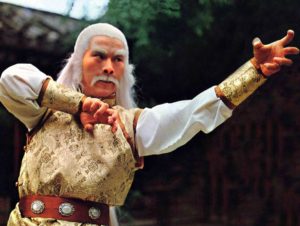
Chang Shan in Seven Steps of Kung Fu.
CS: No, no, no (laughing).
(Speaking in English) This movie, good guy. Next movie, I’m the villain, bad guy.
MT: You are a very good bad guy.
(laughter)
CS: (Speaking in English) Really? You lie. Too much joke, sorry.
(laughter)
MT: I wanted to ask you about Wu Kuo-ren as you worked with him on Ninja Hunter and Ninja in the USA.
CS: (Speaking in English) Ninja in the USA, shooting in Philippines and in Taiwan.
MT: There’s not a lot of information about Wu Kuo-ren. What can you say about him?
CS: Director Wu Kuo-ren hasn’t made a movie for many years, and that was during a certain period of time. Many action directors and actors were affected, and I also left the movie industry at that time, which was 20 years ago. It’s true. At that time, there were many policy factors involved. Wu Kuo-ren had directed many movies, such as Ninja in the USA, which were popular in the US. However, due to policy issues, many movies couldn’t be made, and he stopped directing during that period of time. Maybe it was twenty years ago, and Wu Kuo-ren himself used to be a cameraman before becoming a director. His family members are all cameramen, including his brothers, but they have all left the movie industry now. People of our age at that time had mostly left as well.
MT: What was the reason he stopped making movies?
CS: Politics. Lee Teng-hui. Because there were not many action movies during that time, I didn’t really care, but it might affect Taiwan. It wasn’t good. Many movies were banned and couldn’t be made. They weren’t allowed to be filmed. At that time, Zhang Fu Jian [Chang Fu-chien] became famous. He played Liu Bowen [Legends of Liu Bowen, Liu Bo Wen Chuan Qi, CTS, 1992. Liu Bowen was a Chinese military strategist, philosopher and a politician from the early Ming dynasty known as “Chinese Nostradamus”]. For example, many action actors were banned. Lang Qing went to open a spicy hot pot restaurant, and they all ended up like that. It was due to political factors.
“I left the movie industry when I was 39 years old. It was almost 20 years ago. I’m 62 years old this year. I started to work again in the past two or three years”
At that time, I also left. I was 39 years old. I went into business in 1989, the year when Lee Teng-hui took office in the 78th year of the Republic. I left the movie industry when I was 39 years old. It was almost 20 years ago. I’m 62 years old this year. I started to work again in the past two or three years. I returned in 2015. I have been out of the movie industry for twenty years.
MT: I’ve read in one of your previous interviews that in your last movie they had a Hong Kong actor come to the shoot and his name was always big on the poster while yours was small.
CS: So, my reason for leaving, yes. When I visited England, I spoke about this. It was one of the reasons for leaving the film industry. At that time, we were shooting a movie. For example, I played the villain, and I don’t know if you know Chiu Yan-chun [Vincent Chiu Yan-chun]? He is the male lead now, but at the time we shot the movie, he had just become an actor and we were not very familiar with each other.
So, I played the villain while he played the main character. We shot the entire movie, which took over a month, almost two. For instance, we invited Eric Tsang to come and act for a day or two, and Lin Wei [Lam Wai] to come for a day or two just to have their names in the movie [Drug Tiger, 1993]. Our names were so small that no one would notice. However, I didn’t want to do it because I didn’t feel comfortable. It wasn’t about having our names in the movie or not. We all worked together with one heart and mind. If you come for two days, your name will appear here. Even if you say it’s just a cameo, there’s nothing to say. In the past, they hung the names of guest stars high, even higher than the lead actors because Taiwanese movies couldn’t sell overseas at that time. They had to sell them through Hong Kong, so they hung a few Hong Kong actors’ names in the movie.
This was also one of the reasons, but not the real reason for leaving the film industry. The political factor was the main reason. There were no more action movies. Why would I stay here? Do you understand what I mean? It was a big reason, but at that time, I still had a movie to shoot. Even if it was not bad, many people didn’t have any movies to shoot. So, I said that was also a factor in leaving.
When you asked me why I didn’t make any more movies during my visit to England, it was not just me but also many other crew members. After we finished shooting the movie, they invited us to a wrap-up dinner, but I didn’t go, not because I could not, but because some crew members could not go. We felt sorry for them, so we didn’t go. It wasn’t about excluding Hong Kong actors. If you hang the words “guest star,” I have nothing to say. However, if you hang the names of the lead actors, but only have two or three shots in the movie, then we’re all fighting in the movie, especially in action movies, where it’s easy to get hurt. For example, I was feeling uncomfortable after lunch today, and my old injury was acting up. I couldn’t move, and I kept bending this way. My waist was like this, and that’s how it is when we shoot movies. If the old injury breaks down again, it’s like this. After watching the whole movie, he didn’t have much screen time, and that made me feel uncomfortable.
MT: There was a person in the Taiwanese movie industry that wasn’t very popular among fans or his colleagues as it seems, because he was hard to work with. Do you have a good word for Robert Tai?
CS: (Speaking in English) Robert Tai, he died last year.
MT: Yes, cancer.
CS: I don’t think he was hard to work with. I worked with this person a little bit. It was for a Shaolin martial arts movie [Five Fighters from Shaolin]. The martial arts director at the beginning was someone else, but the boss didn’t pay him, so he quit. During post-production, this person [Tai] took over as the martial arts director. From my personal perspective, he has very high standards for what he wants in a film. Some people might think he’s too picky, but the final product is what matters. It’s not him, but you who will be judged when the movie comes out.
“Extras just come for the money, and he [Robert Tai] demands a lot from them. For example, if you’re supposed to fall down the stairs, he’ll tell you to do it again and again until it’s perfect. He’s a perfectionist”
He can be harsh in his criticisms, but he means well. If you have an idea, and he says “no good”, he’ll keep pushing until you get it right. If an actor thinks differently, they are immature. He takes his work seriously and demands the same from his assistants. However, his assistants respect him very much, even though he’s very strict. He’s trained many directors and martial arts instructors. He teaches what others won’t, and if you don’t learn, he’ll scold you.
(Speaking in English) Alexander Lo Rei, his student.
MT: Yes.
CS: (Speaking in English) Lan Hai-han, you know Lan Hai-han [Allen Lan]? Now director in Beijing.
Some people, like extras, just come for the money, and he [Robert Tai] demands a lot from them. For example, if you’re supposed to fall down the stairs, he’ll tell you to do it again and again until it’s perfect. He’s a perfectionist, so some people in the industry might not like him, but that’s because they’re not as professional. I don’t know him well, but from my experience working with him, I can say that he has his own style, and he knows what he wants. The final product is what matters, and he’s not afraid to push people to get the best result.
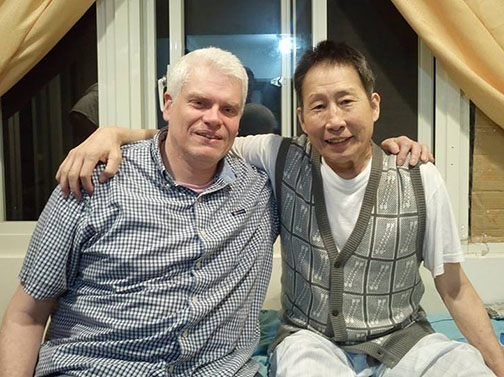
Toby Russell and Robert Tai.
(Speaking in English): If you stuntman, Robert Tai want this cut. No good, one more. No good, one more. No good, one more. Stuntmen: aaargh! (imitates angry stuntmen, then laughs). He good man.
MT: Important.
CS: (Speaking in English) Yes.
MT: I like Robert Tai.
CS: (Speaking in English) I like Robert Tai. Only together one time.
MT: One time?
CS: (Speaking in English) Yes. Shaolin (-)
MT: Shaolin vs. Lama?
CS: (Speaking in English) No. Five, five (-)
MT: Five Fighters from Shaolin?
CS: (Speaking in English) Yes. Ending he come. Ending fight, he come. Maybe seven days, five days. So, I know his work style. No good, one more. OK. Chang Shan, no good. OK. So, I know he is very good man, good action director.
He can be difficult to work with, but I think he’s a good person. I didn’t have a close relationship with him, but that’s my opinion. He passed away two years ago, maybe last year or the year before that. Before he died, Lee Tso-nam, Alexander Lo Rei, Li Hai-hsing, Lu Feng, Suen Shu-pei and I went to visit him.
(Speaking in English) He say, we shoot last photo. Cancer. We’re together, last photo. Robert Tai is good man.
MT: You worked with Alexander Lo Rei on nine movies. He once said if not for kung fu movies, he’d be either in jail or in a gang. Where would Chang Shan be if not for kung fu movies?
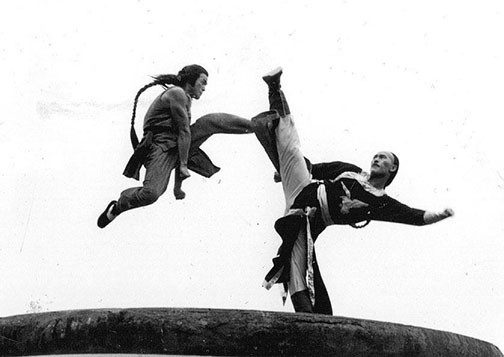
Chang Shan and Alexander Lo Rei in Shaolin vs. Lama.
CS: I don’t know if his personal factors would lead him to join a gang or become a godfather. We met in the film industry. And you asked me, ‘What would you do if it weren’t for kung fu movies?’ At that time, I was living in Korea and working there. Because of my brother, who owned a restaurant, I helped out as a waiter in his restaurant. That was probably the path I would have taken, without any consideration of making films. We never even thought about those things.
MT: Ok, but you have your own barbecue restaurant in Korea?
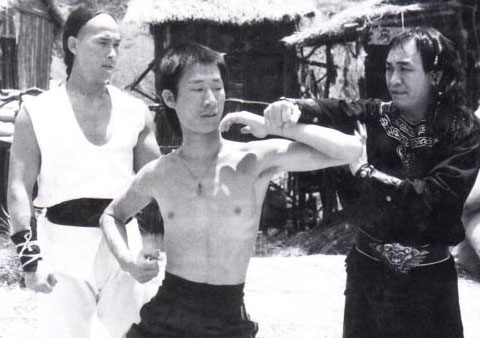
Chang Shan and Robert Tai working together on Five Fighters from Shaolin.
CS: In Taiwan, I left the film industry to open a barbecue restaurant. It’s closed now. After a few years of running the barbecue restaurant, I started doing other businesses and left the industry for almost 20 years. In 2015, my friend Toby found me and asked me to go to England. Later, many people suggested that I come out and make movies. Otherwise, I would have left this circle. Many people of my age left the industry during that time as well. At the time, I didn’t think much about it, but later director Lee Tso-nam suggested that I should make movies and come out to do it.
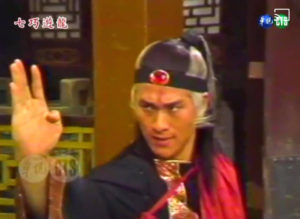
Chang Shan in Artful Dragon TV series.
MT: Great, great. Just one more question.
CS: Okay.
MT: When did you start making TV series here in Taiwan? Do you know how many you have worked on?
CS: At the same time. I didn’t leave the film industry to do TV, but if someone asked me to make a movie, I would make a movie. If someone asked me to do TV, I would do TV, but I always played the villain. I didn’t leave the film industry to do TV at first. When I started, TV stations would ask me to do TV, but I refused because their standards weren’t as strict as in movies. For example, in action scenes, if I thought something wasn’t good enough, I would redo it, but the TV station would say it’s okay and not demand more. When I started doing TV, my wife knew about it. I would say that the shot wasn’t good enough and we should redo it, but they would say it’s good enough. I felt like the standards were too low, and I didn’t like it. Later, they asked me to do a show, but I declined, saying that I had other things to do. Afterwards, I mainly did Justice Bao and worked with my old friends, which was nice. Otherwise, I wouldn’t want to do it.
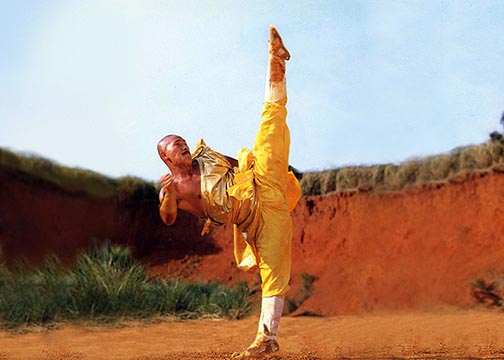
Chan Shang in Shaolin vs Lama.
MT: Excellent.
CS: (Speaking in English) Okay? Yes, thank you. Thank you very much. Hope you have a happy holiday in Taiwan.
MT: I love Taiwan.
CS: (Speaking in English) See you next time?
MT: Yes.
Taipei, 11.11.2018.
Special thanks to Kung Fu Kingdom (they also did a great interview with Chang Shan), Toby Russell, Taiwan Panorama, hkmdb.com and Robert Tai Spirit! for allowing us to source some of their images.

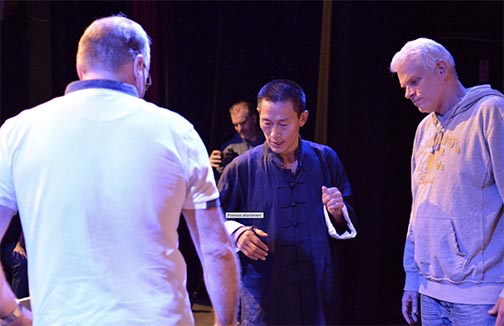
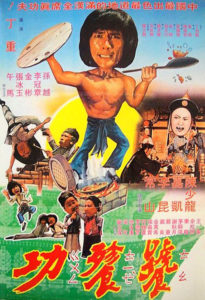
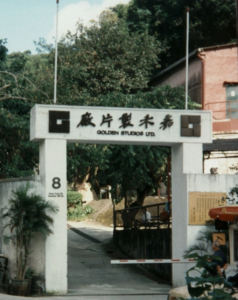
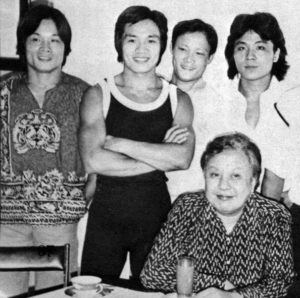

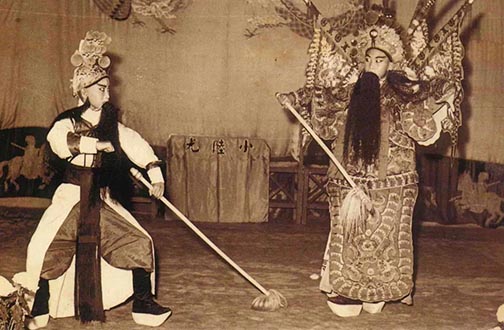
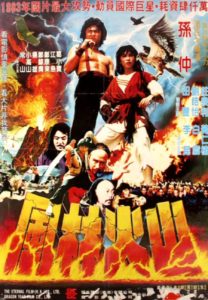
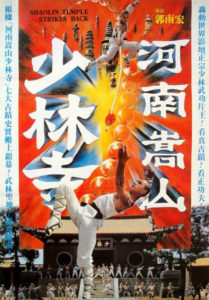
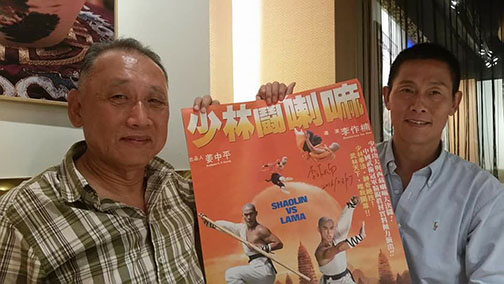
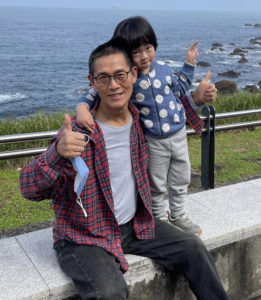
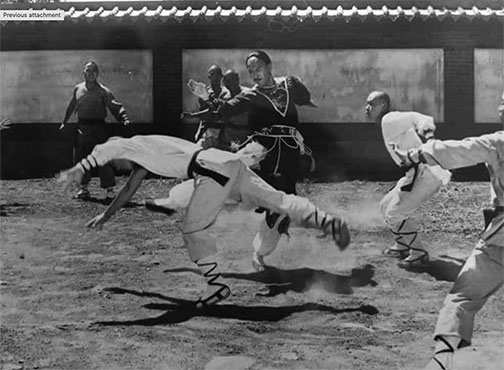
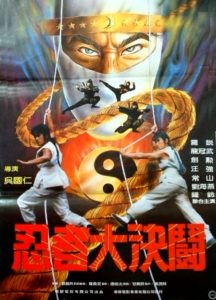
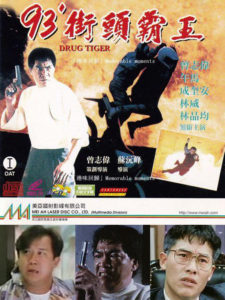
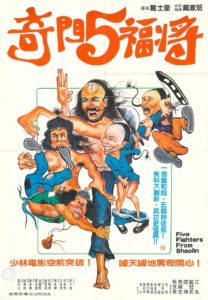



Terrific interview! I like the inside information, but to be really honest I don’t think I ever seen one movie with this guy!
Thanks Scott! You should take time to get familiar with his work, you can start with the movies mentioned in the interview. I’m sure you’ll like Chang Shan in action.
Thanks for sharing. This was a fascinating chat.
Thanks, I’m glad you enjoyed it.
Thanks for doing this interview, It was very insightful. Chang Shan was part of so many classic Kung Fu films, this was well deserving.